Written By: Chevron
There’s no way around it. Swimming is hard. Whether you’re swimming for exercise, competition, or for fun. Swimming is difficult even if many people seem to believe it’s an easy sport. From the technical aspect to the full-body workout, we’ll break down why swimming is so hard
For some suggestions on how to make swimming just a bit easier, check out our companion article: 8 Tips to Make Swimming Easier
Disclosure: This post may contain affiliate links, meaning we earn a small commission at no cost to you if you purchase something through one of our links. As an Amazon Associate, we earn from qualifying purchases. Please check out our disclosure page for more information
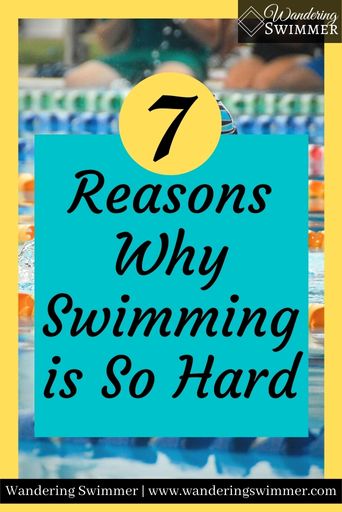
7 Reasons Swimming is So Challenging
1. Swimming Isn’t a Natural Movement
One of the reasons swimming is so hard is because we weren’t built for swimming. The muscles we use to move around are developed for land, not water. Almost everything we do, we do in a vertical position such as standing, walking, cooking, sitting, etc.
More Content for You: 6 Best Prescription Goggles for Swimming + FAQ
With swimming, you use different muscles to keep yourself balanced in the water and moving forward. But that same muscle movement and strength doesn’t translate to land movement.
It seems like it should be an obvious reason why swimming is so hard but it’s often overlooked in favor of more complicated explanations.
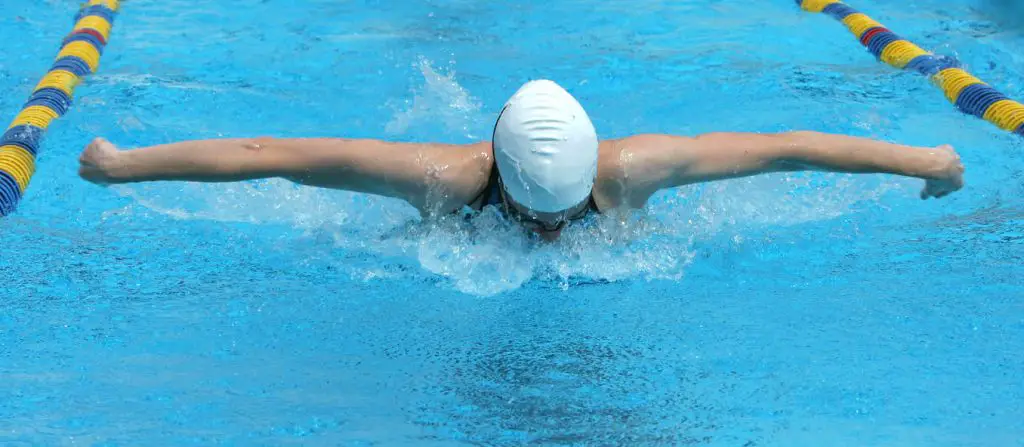
2. Technique Heavy
Swimming is a very technical sport. And while it’s possible to muscle through the water, you won’t be very fast, it’s exhausting to do so, and you could injure yourself.
Swim technique is about the entry of the hand into the water to the catch, through the pull of the stroke, and to the exit, every part of the technique has to be correct. You also need to time the stroke to breathe at the correct time. At the same time, you need to factor in the kick that happens at the same time as the stroke and breathing.
Related article: The Beginner’s Guide to Swimming Freestyle
3. Uses Every Muscle in the Body
You’ve probably heard that swimming is such a good workout because it uses every muscle in the body. And they’re not wrong. With swimming, every muscle is being used at once to:
- Keep you balanced (core muscles)
- Pull you through the water (hand, chest, shoulder, arm, and back muscles)
- Rotate your body to breathe (arms, legs, and core muscles)
- Propel you through the water (feet, leg, and hip muscles)
- Circulate blood through your body while on oxygen deprivation (heart muscle)
All of these muscle groups working together at the same time is one of the reasons swimming is so hard. Not only are you using every muscle in the body, you’re also using them all at the same time. And you’re doing all this while holding your breath.
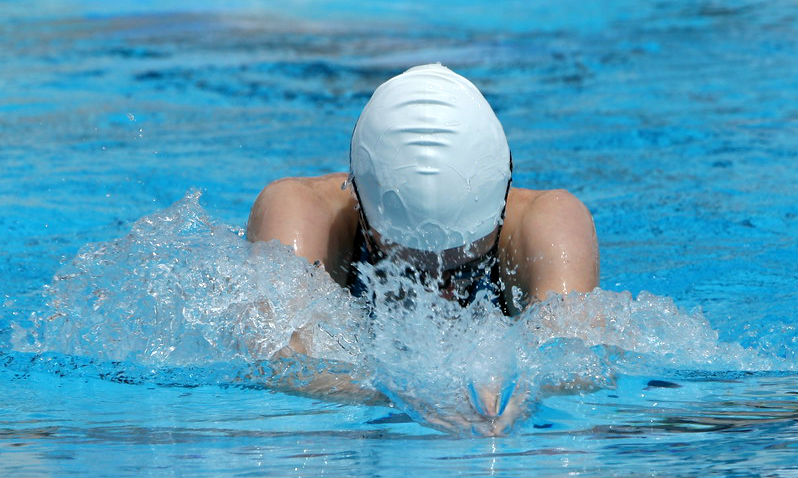
4. Water is Denser Than Air
You may be surprised to know that water is denser than air. About 800 times denser, to be precise.
…There are more water molecules in one liter than there are air molecules. As an example:
Source
– Air density = 1.29 kilograms per cubic meter/1 liter
– Water density = 1,000 kilograms per cubic meter/1 liter
When water is denser than air, it’s harder to move your body through the water. You’re pushing and pulling through something that’s heavier than you’re used to moving through. And in essence, you’re moving weight around you when you swim!
More Content for You: Why Competitive and Lap Swimmers Should Lift Weights
Since water is heavier and denser, it takes more effort for you to move through. This puts a larger strain on the muscles in your body. This not only makes swimming harder but is also one of the reasons you burn more calories while swimming.
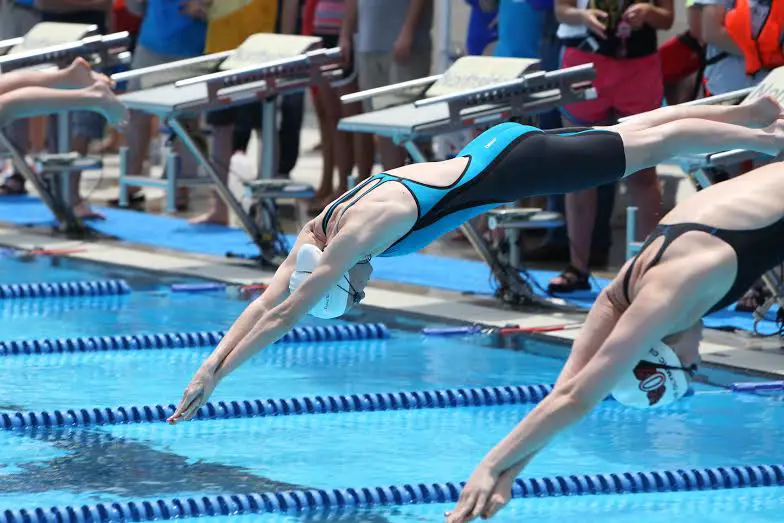
5. Breath Control
Swimming is one of the few sports that you have to hold your breath for large portions of the workout. And this is arguably one of the reasons why swimming is so hard for most individuals.
It’s easy to argue that you can hold your breath for a minute or so while reading this. But it’s easier to hold your breath while doing nothing compared to working out.
Holding your breath decreases your oxygen levels and increases the carbon dioxide in your body. This causes the feeling that you’re running out of air when in actuality, your body is trying to balance out the oxygen and carbon dioxide in your body.
Related articles:
6. Overconfidence
A lot of people find that swimming is so hard for them because they’re overconfident in their physical strength and achievements on land. But those don’t translate into water. And the person who can run miles on end will struggle to make it down and back in a pool.
More Content for You: Basic Pool Etiquette: 15 Ways to Share the Pool
This is why swimming is so difficult and can be so dangerous. Too many people overestimate their athletic abilities and think they can best the water, only to have the water best them. Overconfidence in the water can lead to injury or death.
7. Fear
Part of the reason swimming is so hard is that it’s not just physically difficult, but also mentally challenging. Overcoming the fear of water is incredibly hard, especially as we get older. And for some, the act of putting your face in the water is hard enough.
There’s also the fear that you look ridiculous while swimming and that other people are judging you. Some individuals may also feel uncomfortable wearing a swimsuit in front of others (for this, we recommend a swim shirt or rash guard!)
Related article: Answering Your Questions About Rash Guards
There’s no easy way to overcome any of these fears. You may need to work with a professional to become more comfortable around water. We do encourage you though to try to tackle your fear if you can. Because learning to swim is a life-saving event that no one should be without.
Bonus Content
How to Pick the Right Swim Goggles For You: When it comes time to pick the right swim goggles, you might feel overwhelmed. Consider these 4 things the next time you’re looking at goggles.
Swimming on Your Period FAQ: Yes, you can swim on your period! From one menstruating swimmer to another, here are some frequently asked questions I get about swimming on your period.
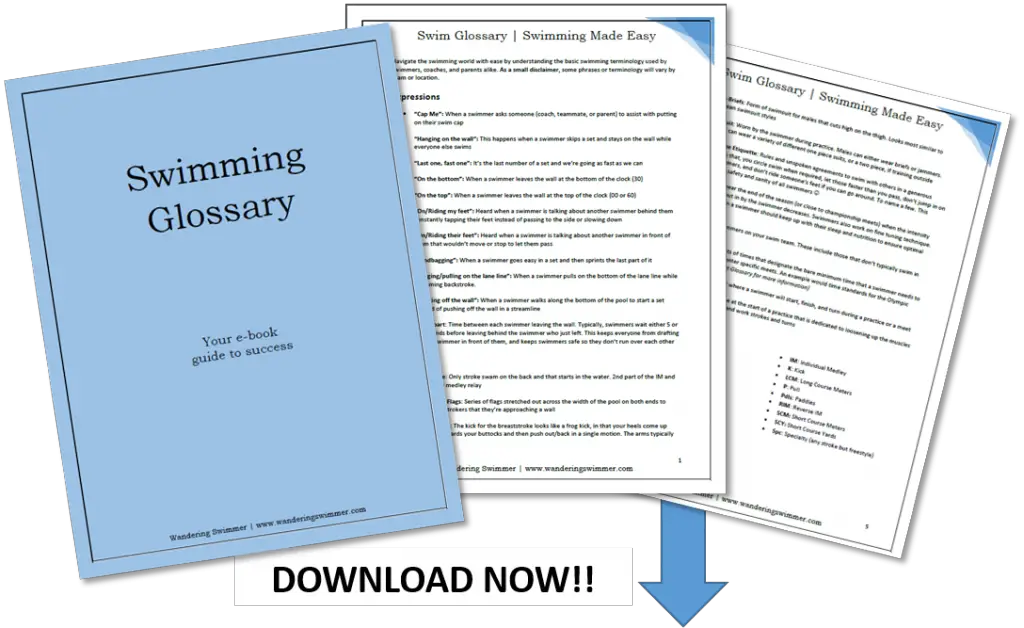
Want to Improve at the Pool?
Join swimmers and swim parents to receive my free newsletter and receive a free Swimming Glossary e-book as a thanks!
Every month you’ll receive tips and coaching to help you find success at the pool.
About
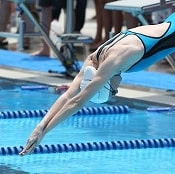
Chevron is a current competitive swimmer with almost 20 years of experience at the local, national and international level. A current USA Swimming and US Masters Swimming athlete, she’s committed to providing guidance to all levels of swimmers and believes that everyone should know how to swim.